
Workshop Exhibition
Five Days Hands on Workshop
Date: October 19-21, & October 26, 27, 2024
The Department of Life Sciences organized a hands-on workshop on Computational OMICS for five days (October 19-21, & October 26, 27, 2024). The workshop was inaugurated by Rev. Fr. Jais V Thomas, Financial Administrator, Kristu Jayanti College, Autonomous on 19/10/2024 at 09.30 am. Omics technologies have revolutionized and transformed our understanding of biological machinery in different physiological conditions. However, the wealth of data generated in modern omics and the fast-evolving technologies poses significant challenges. For meaningful interpretation, sophisticated computational strategies and advanced bioinformatics expertise is required. This five-day hands-on workshop was arranged to develop the required skills to comprehend the latest computational techniques used to analyze high throughput data that support toward understanding of the biological processes, evolution, and diagnosis, and drug discovery. Dr. Vijayanand.S, head of the Department started the session with a Welcome address in the presence of Rev. Fr. Jais V Thomas, Financial Administrator, Dr. Calistus Jude AL, Dean, Dr. Priya Josson Akkara, Programme Coordinator (PG), and Dr. M. Sonia Angeline, Programme Coordinator (UG) Department Life Science, Kristu Jayanti College, Autonomous on 23/03/2024 at 9.15 am. For this workshop, Dr. Nitish Malhotra from University of California USA, Ms. Akshara Dubey and Mr. Anurag K. Singh, from NCBS Bangalore were invited. The participants were trained in R, Python, basic syntax, understanding the NGS data, analyzing RNA and whole genome sequencing data, creating a phylogenetic tree, identifying phylogenetic relationships between species, running the mutation finder software, and various other computational tools used in analyzing high throughput transcriptomics data. Dr. Kushi, shared his expertise on the topic “Experimental setup for RNA-seq and potential use of RNA-seq in diseases and medicine”. Dr. Dileep Francis lecture and training fostered the students with profound knowledge on structure-based and ligand-based drug discovery, molecular visualization using Pymol, molecular docking using autodock vina and virtual screening using PyRx. The resource person clarified queries raised by the participants. On final day quiz and group discussions were conducted followed prize distribution and felicitation to resource person. The session ended on 27th October 2024 at 5.30 pm with vote of thanks by Dr. Kushi Anand.
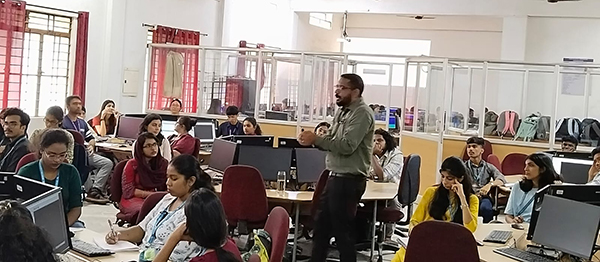
Workshop on Hydra Culture and Maintenance
Date: 29 October, 2024
Department of Life Sciences recently hosted an engaging Hydra Culture and Maintenance Workshop for second and third-year BSc Microbiology students, introducing them to the intriguing biology of Hydra and its distinct microbiome. This hands-on experience allowed students to explore the various ways Hydra is used in life sciences and microbial research, showcasing its vital role in complex scientific investigations.
Led by our dedicated student volunteers from the Hydra Culture Facility, the workshop provided participants with comprehensive training in Hydra maintenance. Students had the chance to learn key techniques, including feeding live Artemia to Hydra—a valuable skill each participant was able to practice independently.
The workshop saw enthusiastic participation, with students expressing their appreciation for the opportunity to handle and feed Hydra themselves. Many also requested advanced workshops in this area, as highlighted in the feedback collected.
We extend our heartfelt thanks to everyone involved in making this workshop a success. We look forward to offering more interactive and practical learning experiences that inspire our students and deepen their knowledge in the field of microbiology.
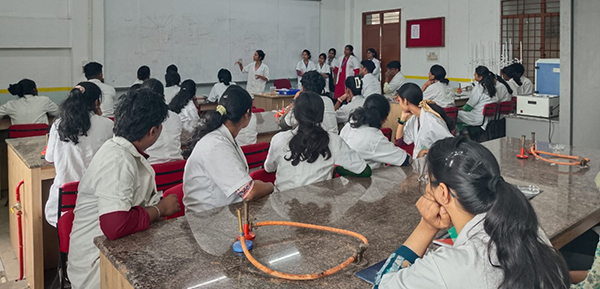
Workshop on Zero Waste Day
Date: 11 March, 2024
The UNAI Hub for SDG-1, in collaboration with the Department of Life Sciences at Kristu Jayanti College, organized a workshop on March 11th to commemorate Zero Waste Day. Titled "Waste to Value," the workshop aimed to educate participants on the production of ethanol from bio-waste. Commencing at 3:30 pm in the Genetics Lab, the event was inaugurated by Dr. Elcey C.D., Head of the Department of Life Sciences, Dr. Jonas Richard A, Coordinator of the UNAI association, and Dr. Nathiya T, UNAI Coordinator, Life Science. They addressed attendees, underscoring the urgent need to raise awareness for a sustainable environment. Dr. Jonas Richard stressed the significance of such initiatives and urged students to integrate workshop insights into their daily lives. Dr. Prasanna Kumar C, from the Department of Life Sciences, served as the workshop's resource person, elucidating its objectives. The workshop provided undergraduate and postgraduate students with a comprehensive understanding of ethanol production from biowaste. The process, utilizing algae sourced from nearby lakes as a sugar source, involved the use of molds and fungi to breakdown complex sugars for easier utilization by yeast. Additionally, fruit peels and waste fruits served as other sugar sources. Post-fermentation, distillation was conducted to obtain ethanol. Students had the opportunity to observe algae collection and the functioning of the distillation unit. The session concluded successfully at 4:30 pm, empowering students with knowledge on sustainable ethanol production and fostering a mindset conducive to environmental betterment.
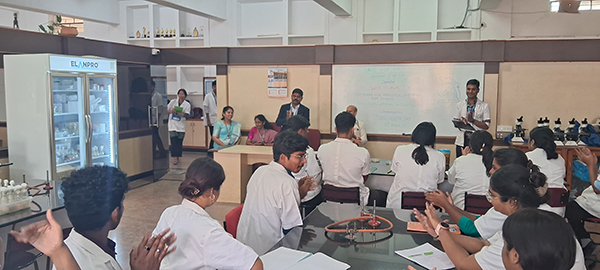
Creatrix 2024
Date: 27 February, 2024
Creatrix 2024, held on February 27th, 2024, at Kristu Jayanti College, showcased innovative ideas and scientific exploration within Life Sciences. Organized by the Life Sciences Department to honor National Science Day, the event featured over 100 student groups presenting diverse exhibits. These included imaginative models and charts spanning botany, biotechnology, genetics, biochemistry, and microbiology. Under the guidance of faculty coordinators Dr. Malathi R, Dr. Deepak P, and Dr. Saraswathi, Creatrix 2024 unfolded seamlessly. Student secretaries, Mr. Pranav Rao and Ms. Soumya Sivakumar, played key roles in ensuring the success of the event. The session was inaugurated by Rev. Fr. Emmanuel PJ and Chief Guest Ms. Lipika Sahoo, set the tone for the event, emphasizing the importance of scientific inquiry. Exhibits were meticulously evaluated by esteemed faculty members, including Dr. Kalai Selvi, Dr. Don Caiero, and Dr. Priya Josson, with cash prizes and certificates awarded to outstanding presentations. Creatrix 2024 served as a dynamic platform for students to delve into the depths of life sciences, fostering a deeper appreciation for scientific inquiry and innovation. Future editions could explore opportunities for interdisciplinary collaboration and expanded outreach, building on the success of this event.
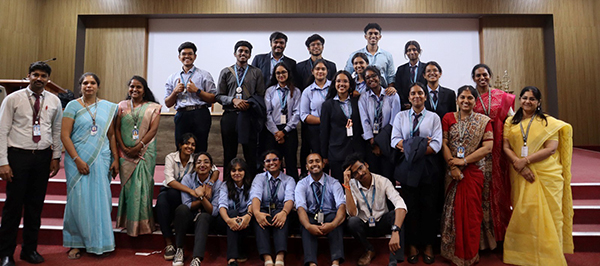
Hands on Training: Gene Expression Profiling Using Real Time PCR
Date: 19 & 20 February, 2024
A workshop on gene expression profiling using real-time PCR was organized by the Department of Life Sciences, Kristu Jayanti College. Dr. Deepti Saini, from Protein Design Pvt. Ltd, SID Innovation Centre, Bengaluru served as the resource person for the event. The two-day program took place on February 19th and 20th, 2024, providing comprehensive lessons on the principles and procedures involved in gene expression studies. Additionally, participants received hands-on training in techniques such as mRNA isolation, cDNA preparation, and RT-qPCR. A total of 23 students actively participated in the workshop, which commenced on February 19th with an inauguration and an introduction to the resource person. Dr. Priya Josson, Dr. Elcey C D, and Dr. Dileep Francis were also present at the occasion. The sessions began with theory classes on RNA isolation and the separation of mRNA, followed by practical laboratory sessions in the afternoon. During this hands-on experience, each participant performed the experiments. The second day of the workshop focused on cDNA isolation and qPCR, including a demonstration on using the nanodrop instrument. The workshop concluded in the evening with a final session summarizing the topics covered throughout the program. Dr. Deepti addressed all the doubts the students had. Overall, the workshop proved to be highly beneficial for all participating students.
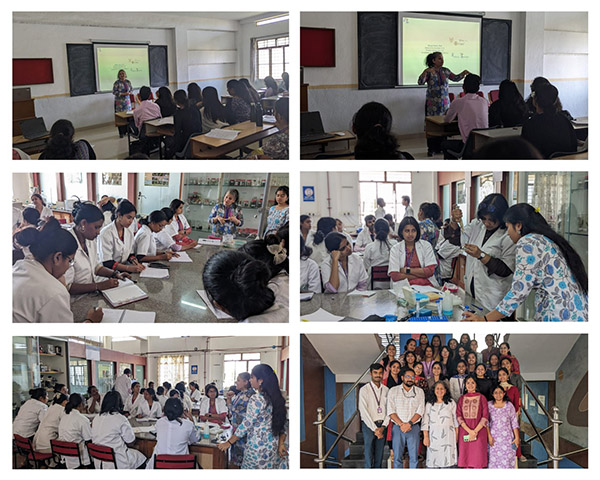
Workshop on Digitized Clinical Platform
Date: 03 February, 2024
On the 3rd of February, 2024, the Department of Life Science in collaboration with Cloudbyz organized a workshop on Digitized Clinical Platform. Cloudbyz is a software company that focuses on creating cloud-based software for biological sciences, especially concerning healthcare. The company provides various services with respect to clinical trials and practices, although its main focus is on digitizing the field. They offer various platforms to organize and streamline the process.
The director, Mrs. Nandhini Hariharan briefed about the company and its ideals and introduced her fellow colleagues. After which the session moved on to clinical trials. The speaker Ms Ananya listed the components required for a clinical trial. She explained the people involved and each of their roles and also touched upon how the company fits into this system. She then moved on to explain each of the phases of clinical trials and paid heed to include various case studies of the same to make the session more connected to real-world applications. The session was extremely lively and interactive. It also highlighted the implementation of technology and cloud-based platforms in Life Science. All in all, the session was well received and imparted much-needed knowledge to its audience.
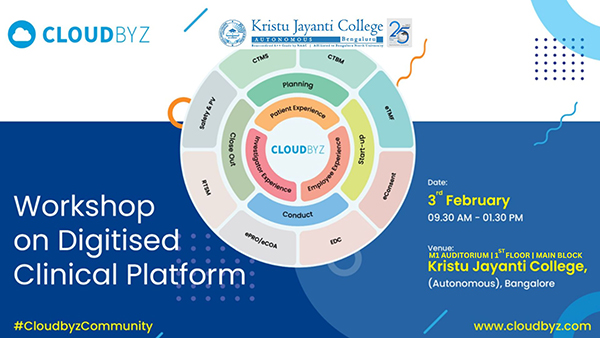
Workshop on Scientific Writing
Date: 07 September, 2023
The Department of Life Sciences, Kristu Jayanti College, Bengaluru organized a ‘Workshop on scientific writing’ for I and III semester M.Sc. (Biochemistry, Microbiology and Biotechnology) students on September 7th, 2023. The workshop emphasized the importance of approaching scientific writing in a systematic manner. This approach is crucial for maintaining high research standards and metrics in the field. The workshop covered techniques and approaches for creating impactful literature reviews. Literature reviews are essential for contextualizing research within the existing body of knowledge and identifying gaps in the literature. Students were taught how to efficiently use Zotero, a software application that helps collect, organize, and cite references. Proper referencing is a fundamental aspect of scholarly writing and contributes to the credibility of research. These skills are not only important for academics but also for fostering a research culture among students. Developing these competencies can empower students to excel in their research pursuits and contribute to the scientific community. Overall, this workshop appears to have provided students with valuable knowledge and tools to enhance their scientific writing abilities and research skills. Such initiatives are crucial for preparing the next generation of scientists and researchers.
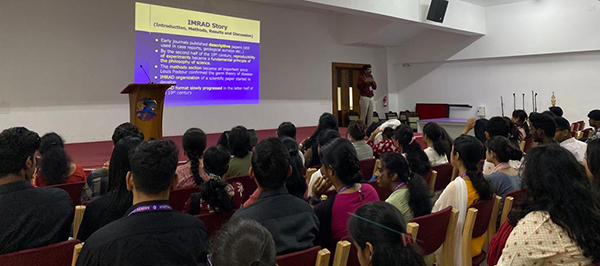
Workshop on the Science of Pipetting to Perfection
Date: 22 August, 2023
The Department of Life Sciences, Kristu Jayanti College organised a workshop on the Science of Pipetting to Perfection on 22/08/2023 by Eppendorf India Private Limited. Understanding the importance of micro pipetting skills for achieving precise experimental results in all areas of Life sciences was the aim of conducting this workshop. It was conducted for the III Sem M.Sc Microbiology, Biotechnology, Biochemistry. Eppendorf is a German-based company its headquarters is in Hamburg, and active since 1945. It is a leading life science company that manufactures and distributes equipment for laboratory use worldwide. The session was handled by Mr. Bharath Kumar, Sr. Eppendorf Teritory Manager, and Ms. Rashmi, Eppendorf Teritory Manager. The main key points discussed during the session were understanding the pipetting principles, mastering pipetting techniques, factors influencing pipetting results, and best practices for decontamination procedures. Each student was provided hands-on experience in forward and reverse pipetting of different types of solutions such as aqueous and nonaqueous, also students were taught to dismantle the pipette and sterilize it to avoid contamination, which can help maintain the pipette in good condition. Overall the students of Life Sciences got a great opportunity to learn and experience various pipetting techniques.
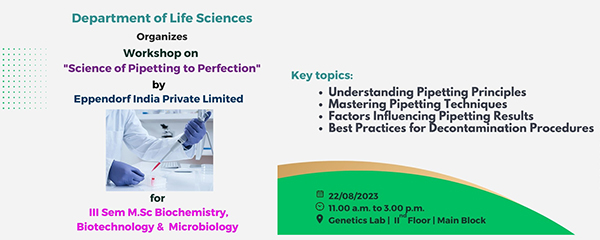
Faculty Development Programme on “Techniques in Cytogenetics”
Date: 10th July to 13th July, 2023
The Department of Life Sciences supported by the DBT Star college scheme organised the Faculty development programme on “Techniques in Cytogenetics ” for 4 days from 10/07/2023 to 13/07/2023. It was inaugurated by Rev. Fr. Deepu Joy, Director, Student Welfare Office, Kristu Jayanti College, Autonomous on 10/07/2023 at 9.30 am.
Scope and importance of cytogenetics in today’s scenario has become indispensable in the field of life sciences. It requires specific technical skills to carry out successfully. The primary aim in organising the FDP on Techniques in Cytogenetics is to guide faculty members through fundamental areas and to demonstrate an understanding of basic concepts of chromosome structure and karyotyping as well as to learn mosquito culturing and understand various stages of mosquitoes life cycle . The resource person for the FDP is Dr. Venkateshwarulu Raavi Ph.D. from Sri Devaraju Urs Medical college, and Dr.TPN Hariprasad from Department of Lifesciences, Bangalore University, Bengaluru. The faculties were trained to harvest blood cell culture, Cleaning, Sterilization, Aseptic Techniques, Revival of Cells, Media Banding Techniques, Karyotyping, isolation of mosquito larvae’s, pupa, adults and to isolate and observe polytene chromosomes.
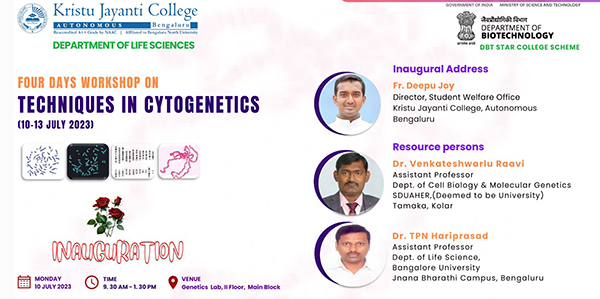
Workshop on Advanced Programming Practices
Date: 16th & 17th March, 2022 | 9.30 am- 12.30 pm
Venue: M3 Auditorium (Main Block, III floor)
Classes Attended & Number of beneficiaries: For II semester PG students, 91
Name and details of the Resource Person:
Session-1 : 16th March. 9.30 am – 12.30Pm
Resource Person: Ms. Alna Maria Isac, Assistant Professor, Department of English (UG), Kristu Jayanti College (Autonomous), Bengaluru.
Resource Person: Dr. R.Velmurugan, Associate Professor, Department of Computer Science (PG), Kristu Jayanti College (Autonomous), Bengaluru
Topic: “Computer fundamentals, Architecture and Software”
Dr. R.Velmurugan, during his talk explained the basic architecture of computer and elaborated on hardware and software. He also touched upon the functionalities and advantages of computers. Sir explained the logic gates, number system, time division and multiplexing. He elaborated on Object Oriented Programming and C programming. During his talk he explained about C programming, C-Compilers and Data types in accordance to C language.
Session-2: 17th March. 9.30 am – 12.30Pm
Resource Person: Dr. A.Muruganantham, Associate Professor, Department of Computer Science (PG), Kristu Jayanti College (Autonomous), Bengaluru
Topic: “Introduction to Perl and Scripting”
Dr. Muruganantham enlightened the students on Perl; Practical Extraction and Reporting Language. In Continuation of the programming language learnt on the previous day. Sir gave a quick summary and started off with Perl- Language. He explained about Perl basics, Data types, Variable types, Scalars and its operations. He briefed on the use of Perl language in Bioinformatics.
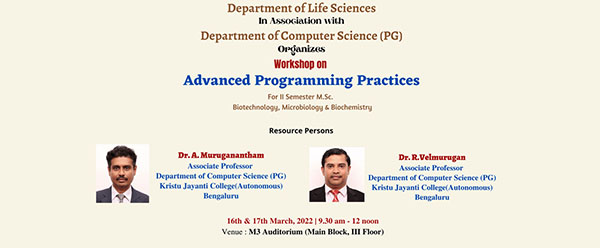
Two part workshop on Forensic Odontology
The Unit of Forensic Science at Kristu Jayanti College, Bangalore organized a two part workshop on Forensic Odontology for students and external participants on 9th and 23rd of October 2021.
The session was inaugurated on 9th October, 2021 by Dr. Muhammad Nasir Ahmed, a renowned forensic anthropologist and Fr. Dr. Augustine George, Principal, Kristu Jayanti College.
The Workshop had total of 6 session of which 3 sessions happened on each part of the workshop.
The resource persons for the workshop was Dr. Akhil S Shetty, oral pathologist and forensic Odontologist and Dr. Shrivya Saloni, Pedodontist and forensic Odontologist.
The topics covered during the workshop included – Dentition and dental anomalies, Identification of tooth using cases and radiographs (OPG & IOPA), Age estimation using teeth, report writing in forensic odontology, Rugae analysis and lip print analysis. The sessions were a good mix of both theory and demonstration which helped the participants understand the concepts in a simple manner. The resource persons also provided real-life case examples for the participants to learn from.

Workshop on Academic Aptitude Assessment (AAA)
Learning needs identification and assessment is a crucial stage in the educational process that marks a turning point in the students’s education. It is the responsibility of the teacher to identify and meet the needs of every learner without any discrimination and make measures to overcome that. Academic Aptitude Assessment (AAA) is a learning level identification mechanism designed by Kristu Jayanti College which helps in identifying and assessing the slow, average and advanced learners and also paves the way for the teacher to improve the academic performance of the student’s learning level at every stage, of the particular course. The Life Sciences department staff members were briefed about AAA on 16th Sep 2021. The teachers were explained with three components of AAA namely Pre-Course, Mid-Course and Post-Course AAA. Based on the Pre and mid-course learning level identification, the students could be categorised as Advanced, average and slow learners.
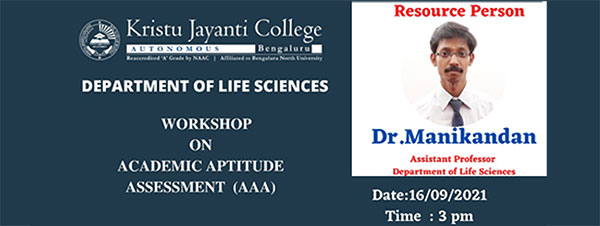
Workshop on Bioanalytical Instrumentation
Faculty workshop was conducted on 30.06.2021(Wednesday) at 10am. The main objective of this workshop was to create hands on experience of ELISA technique. Recourse person was Dr. Shahab Uddin, Application Scientist, Thermo Fisher Scientific, who gave a complete insight of E LISA technique. Participants were the Dean of Sciences Dr. Calistrus Jude, Head of Life science Department Dr. Elcey C.D and the faculties of Life science department Dr. Chalaraj Immanuel, Dr.Vaiyanandh, Dr. Esther Shoba, Dr. Dilip Franscis, Dr. Shivagama Sundari, Dr. Sonia, Dr. Priya, Dr. Sangeetha Menon, Ms.Chethna Dr. Arun, Dr. Manikantan, Dr. Hanumanthappa, Dr. Reena Jhosphine, Dr. Malathi, Dr. Indhira, Dr. Roopa, Dr. Ashok, and Ms. Kushbu.
The session begun with the basic concepts of instrumentations used to measure light at laboratory level such as photometry, fluoremetry, luminometry, fluroscence polarization, TRF and alpha screen. The principle, working methodology and applicatory part of all the instruments were thought in detail. Significance of filter and monochromators in the process of wavelength separation was explained with examples. Types of absorbance in in photometry (Visible and UV absorbance) was stressed on. The wavelength of light used to absorb, excite and emit light to create florescent and luminescence effect was demonstrated virtually. Advanced level of alpha screen was Alpha LISA kit introduced to the participants.
The methodology and features of the Software called Scan-it software that is used to control the instrument were explained well in detail. Power point presentation as well as the demo of the instrument was shown .It was justified that the instrument and software when paired the agenda can be customized as per the user’s unique requirement and allow the program to run all at once. The importance of the software to access the instrument was stressed on. Efficiency of the system and the feasibility of the instruments were elaborated. Applicatory features of the instruments were versatile.
This session was definitely an interesting and fruitful session which created an impact in all the participants about the importance of various techniques used to measure the wavelength light and advanced software that makes the process simpler and user friendly yet accurate and sensitive.
Special thanks to the resource person and the department for organizing such a worthwhile session.
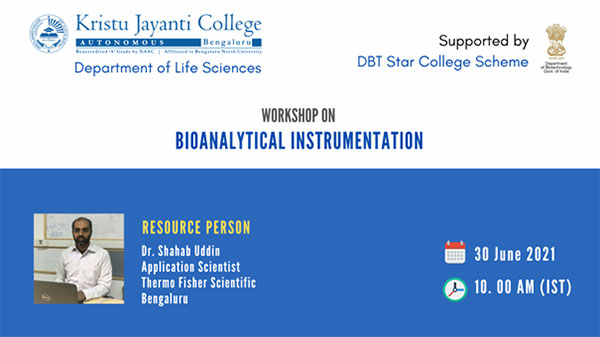
Creatrix- Where creativity meets Science!!!
Creatrix, an annual science exhibition organized by Department of Life Sciences, Kristu Jayanti College (Autonomous), Bengaluru. It was conducted on the 7th of February 2020 for the undergraduate students of Department of Life Sciences. The event was inaugurated by Dr. Gopalakrishna Ramaswamy, Founder and CEO, Theracues Innovations Private Limited. He expressed his appreciation and interest in the models displayed by the students and showed his eagerness and curiosity in listening to the students explaining about their models.
This event showcased and evaluated the creativity, hard work, innovation and brilliance of the students. Undergraduate students of Life Sciences exhibited their innovative working models related to Biotechnology, Microbiology, Biochemistry, Genetics, Botany and Forensic Science, the exhibits were judged by faculties and alumni of Life Sciences Department. This time first year students of newly introduced courses Botany and Forensic science also presented their models.
Seventy three models were displayed by the students. Creatrix presented innovative working models and interesting investigation projects which can be considered as the new approach to solve the rising environmental crisis, in a scientific way. Students and judges equally found the exhibition enthralling and informative.
Totally thirteen teams comprising of ten consolation prizes and first three prizes were awarded with certificates and cash prizes. The exhibition was also visited by upper primary section students of Government Primary School, K. Narayanapura, Kothanur Post, Bengaluru. Overall the event was a learning experience for the students and the visitors alike.
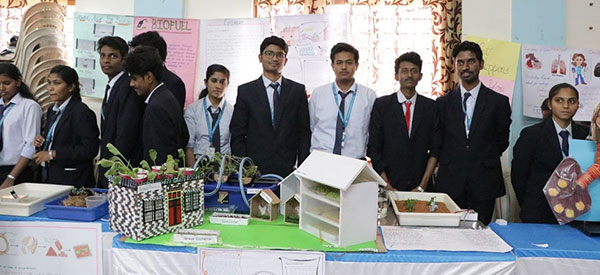
Workshop On Techniques In Molecular Biology
Molecular Biology has transformed Biological Sciences from the precincts of a superficial understanding of living organisms based on gross morphological observations to a broader and in-depth perception based on micro and macromolecular structures and their interactions. The field that has its roots in the pioneering works of James Watson and Francis Crick on the fascinating macromolecule DNA also was instrumental in the advent of the wave of new Biotechnology that has facilitated sumptuous leaps in Applied Biology and has had a huge impact on Medical, Agriculture, Food and Environmental Sciences to name a few. Academic and Industrial research in Biology has also been redefined by Molecular Biology. An analysis of the molecular underpinnings adds credibility and brings in sophistication to any research on living organisms and life processes. Any discourse on modern Biology is unintelligible without molecular insights. It becomes pivotal for academic faculty in the area of Life Sciences to equip themselves with an understanding of Molecular Biology to be efficient disseminators of knowledge and potential stakeholders in the furthering this knowledge. Familiarising one with the techniques in Molecular Biology would enable cutting edge research and state of the art teaching.
In an attempt to empower its faculty in the basic tools of Molecular Biology the Department of Life Sciences organised a workshop on Techniques in Molecular biology on 8th & 9th of May 2019. The two days hands-on training was inaugurated by the Principal, Rev. Fr. Josekutty P. D in the presence of the Dean of the Faculty of Sciences, Dr. Calistus Jude and the Head of the Department, Dr. Elecy C.D. The event had training sessions on Nucleic acid isolation and analysis, DNA amplification by Polymerase Chain Reaction (PCR), Molecular Cloning, Protein isolation and fractionation and Sodium Dodecyl Sulphate - Polyacrylamide Gel Electrophoresis (SDS-PAGE). The feedback that the organising team received from the participants was overwhelming and inspiring. Most of them shared the view that the workshop was technically enlightening and has also served to reinforce collegiality among the faculty. The workshop that witnessed exciting moments of learning and sharing of knowledge was formally concluded by a Valedictory address by the Vice Principal, Rev Fr. Augustine George who appreciated the efforts taken by Dr. Dileep Francis and Dr. Jemimah Naine, the workshop convenors’ for the successful completion of the workshop. He also articulated that an individual remains young up until he goes on learning.
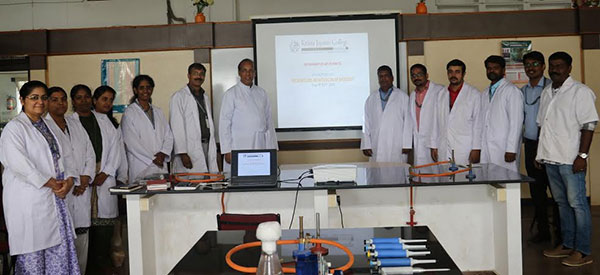
Creatrix 2018 – Annual Intra -Collegiate Life Science Exhibition
Creatrix 2018, an intra collegiate science exhibition steered annually by the Department of Life Sciences was organized on 14th December 2018. The budding scientists of our department presented many creative ideas as exhibits. We had 67 teams with a number of 3 in each group and were named after eminent scientists of diverse areas of Life Sciences such as Pasteur, Lister, Khorana, Ehrlich, Hoippocrates, Maheshwari, Rao, etc. The exhibition was inaugurated by Dr. Varsha Sridhar, Director and Co-founder, Molecular Solutions Care Health, Bengaluru and presided by Rev. Fr. Josekutty P D, Principal, Kristu Jayanti College. In the inaugural address, Dr. Varsha Sridhar probed the students to assess themselves and stimulated students to show innovation in all possible ways of approaching life. Esteemed Principal Rev. Fr. Josekutty P D, in the presidential address motivated students to pursue research and envisioned that the students of KJC be in the list of Nobel Prize laureates. Still models, working models, and projects were a treat to everyone’s eyes. The Exhibits were creative and attractive and some were marvelous. The exhibits included eco-friendly approach of treatment of industrial effluents, waste water treatment, working model of the heart, dialysis, vision formation in the brain etc., and the uniqueness of the exhibition was the integration of study of bimolecular events with sensors and construction of a gel documentation system at the laboratory level at a feasible cost. Alcohol sensor, called Alcohol sensor and working on sensor mechanism was designed innovatively using simple mq3 sensor which is connected to a buzzer that buzzes to indicate alcohol as low as 0.03%. Pulse Meter consisted of a sensor with LED connected to a laptop programmed to detect the pulse and displays your pulse rate graphically both. Adaptation of a novel approach of cleaning waste water from domestic and industrial wastes using corn cobs through adsorption techniques connected to a turbidity sensor was exhibited. Eco-friendly approach of making homemade bioplastic using banana peels and other available homemade ingredients and waste water treatment using electrobacteria Shewanella oneidensis that has the potential to purify water 10 times faster than the conventional methods was informative. Exhibit of self-sterilization of door handles of public toilets using Arduino board sensors was at its infancy but very promising for the prevention of infection. .Such exhibitions have to be encouraged because students get an opportunity to present their ideas. New ideas grow in the minds of children. If they cannot present or express them it is of no use. So exhibitions are opportunities where ideas will begin to bloom for the development of the world. SRK microscope self -named after a team’s innovative approach to visualize the image of the object on the screen of a laptop using an inbuilt image sensor and with less strain on the eyes was indeed a great idea. The entire microscope including the coarse adjustment knobs were made using card board. Attention-grabbing exhibit was gel-documentation system built in the form of bio pyramid fitted with a camera on the top and controlled by laptop/phone using software. This exhibit had it uniqueness of being compact, easy to use and very important being cost – effective. With further improvements it could be definitely be affordable at a lower price as compared to the market price without being compromised on the quality. All the exhibits were exceptional and remarkable, and as encouragements for their hard work 3 best exhibits were chosen as winners. Thus the event, aimed at innovativeness and creativity of various working and static models. This year also the students as a team made the event a grand success.
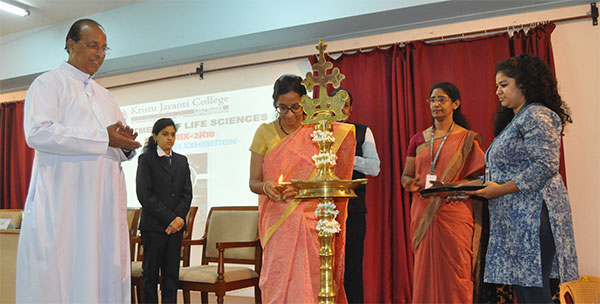
MinION- A low cost, real time, potable 3rd generation sequencer for application in whole genome sequencing and met genomics
The students were introduced to different DNA sequencing techniques and to the portable real time device for DNA and RNA sequencing on 31 August 2017. The components and working principle of this portable sequencer was explained to the students. He further explained that, this DNA sequencer is being used for a number of biological analysis techniques including de novo sequencing, targeted sequencing, RNA sequencing, met genomics, epigenetic etc. He also mentioned that, researchers from various streams like environmental research, human genetics, clinical research, microbiology, infectious diseases, cancer research, industrial diagnostics, agriculture etc. are using this portable DNA sequencer worldwide. The advantages and efficiency (a flow cell can generate 10-20 Gb of DNA sequence data) of the instrument was also discussed. He touched upon the software called “Albacore” which is used to read the sequence. Mr. Rahman, technical expert from the same company explained the mechanism of DNA sequencing and the software used to analyze sequence data.
INTERNATIONAL EXPERT LECTURE
Prof. Peter Monk on 14 September 2017, shared his research about preventing the emergence of antibiotic resistance with the students. Peter monk first explained how a bacterium develops resistance against drugs by citing simple examples and further explained the consequences of it. Peter Monk described about the receptors present on various cells in our body to which the bacteria binds. After binding to the receptors on cell surface, they grow, reproduce (forms a biofilm) and some become antibiotic resistant.
There are several ways exist to prevent bacteria from gaining antibiotic resistance, one simple way is to prevent the attachment of bacteria on target cells.
The lecture gave an insight to students and faculty about the function of tetraspanins in association with membrane protein in regulating the assembly of multimolecular signaling and new technique to prevent antimicrobial resistance “non-stick skin
INTERNATIONAL EXPERT LECTURE: Production of antibodies and using them to diagnose and cure diseases including Cancer
Dr. Lynda Patridge gave a brief introduction about antibodies and how they work against infectious organisms or cancer cell in the body on 14 September 2017. She next explained the process of generation of antibodies against certain proteins. She explained a technology that her company is working on in which certain proteins are isolated from cancer cells and antibodies are raised against those proteins.
A specific immunotoxin which can kill cancer cells will be “tagged” with that antibody and injected into the system. Since the antibodies are specific and tagged with an immunotoxin, they bind to the cancer cells and release the immunotoxin which ultimately kills the cancer cells. She called these as “Magic Bullets of Cancer.”
CREATRIX – A Life Sciences Exhibition
Creatrix 2015, The Life Science exhibition was organized by the Department of Life Sciences, Kristu Jayanti College, on Wednesday, 21st Jan 2015. The exhibition showcased a relay of lively exhibits that depicted various concepts in Biotechnology, Biochemistry, Microbiology and Genetics. The event was inaugurated by Fr. Josekutty, Principal, Kristu Jayanti College in the Mini auditorium I. A total of 30 stalls were set up displaying models and posters. The presentations were made with the aid of working models, posters and live demonstration. An interactive fun zone conceptualized in science was also part of the exhibition. Live demonstrations included simpler and rapid methods of DNA extraction, Natural dyes which can be used as pH Indicators, Water purification process with the help of reverse osmosis and reducing hardness of water by natural filtration methods.
Life Science Exhibition
The students of Life Sciences Department conducted an exhibition on the 20 of March 2013 from 12 pm onwards in the Mini Auditorium 01. The exhibition was inaugurated by our Principal, Fr. Sebastian TA. Ms. Romeena Thomas delivered the welcome speech. All the under graduate students were the active participants of this event. Through various charts and models the students portrayed the present issues and scenarios related to environmental safety and self-awareness of various energy resources of our Earth. Students and faculties from other departments visited the exhibition. On the whole it went smoothly and it was a good platform for the students to show their creativity.
WORKSHOP ON FRONTIERS IN BIOLOGY
The department of Life Sciences, Kristu Jayanti College under the auspices of the three science academies - Indian Academy of Sciences, Bangalore, The National Academy of Sciences, Allahabad and Indian National Science Academy, New Delhi organized the Science Academies Lecture Workshop on “FRONTIERS IN BIOLOGY” on 23& 24 September, 2013. The workshop was attended by 222 students, of which 97 participants were from 9 different colleges, 110 students and 9 faculty members from Kristu Jayanti College.
The first lecture on “THE COMPLEXITY OF FUNCTIONAL GENE EXPRESSION” was presented by Prof C. Durga Rao from the Department of Microbiology and Cell biology IISc. He highlighted on the fundamental concepts of gene expression such as the central dogma of life, the mechanism of DNA transcription and post transcriptional modifications including, capping, tailing and splicing machinery. His discussion also touched upon the key points in Human genome project. He concluded the lecture explaining the role of miRNA and siRNA in regulation of gene expression
The second lecture on “NON- CODING RNAs” was presented by Prof. Kumar Somasundaram from the Department of Microbiology and Cell Biology, IISc. Differences between the coding and non-coding RNAs, different types of non-coding RNAs, relevance of microRNA in cancer were the highlights of his lecture. The lecture also included a brief presentation on cancer, methods to quantitate miRNAs and an overview on Glioma- the most common brain tumor arising from glial cells.
The third lecture on “DNA REPAIR AND CANCER” was presented by Prof. Sathees C. Raghavan from the Department of Biochemistry, IISc. The lecture started with the introduction to cancer, oncogenes and protogenes. He moved on to the major DNA repair mechanisms involved in human system like mismatch repair, excision repair, bypass repair, double strand and single strand repair. DNA damage as the cause of formation of cancer cells was emphasized during the lecture. Dr. Sathees also touched upon various techniques used in cancer research.
The fourth lecture on “CANCER STEM CELLS: THE TROJAN HORSES WITHIN CANCER” was presented by Prof. Annapoorni Rangarajan from the Department of Molecular Reproduction, Development and Genetics, IISc. The main focus of the lecture was on the role of stem cells within cancer tissue in the genesis of cancer, stages of origin of cancer which includes the stages of senescence, immortalization and transformation. Major models for carcinogenic studies like stochastic and hierarchy model were also discussed.
The fifth lecture on “Genetics of Geometry: How genes regulate biological shapes” was presented by Prof. Utpal Nath from the Department of Microbiology and Cell Biology, IISc. He presented the rules for the growth of organism based on the gradients of growth and differentiation. He explained the mechanism of allometry based on the diversified expression of miRNAs and growth regulating factors (GRF). He concluded his lecture citing the application of these studies in plant tissue culture for selecting the best explants.
The second day of the lecture workshop started with an overview of Bioinformatics by Prof. Nagasuma Chandra from the Department of Biochemistry, IISc. Dr. N. S. Chandra explained bioinformatics as the coherent framework to integrate various biological resources. Other highlights of the lecture included the major areas in bioinformatics, an overview of sequence analysis and advantages of protein sequence analysis and efficient utilization of the information contained in the databases.

